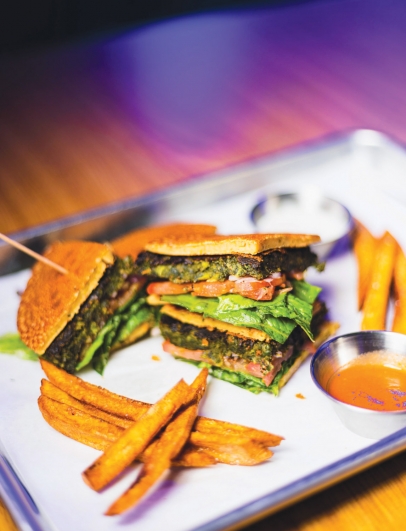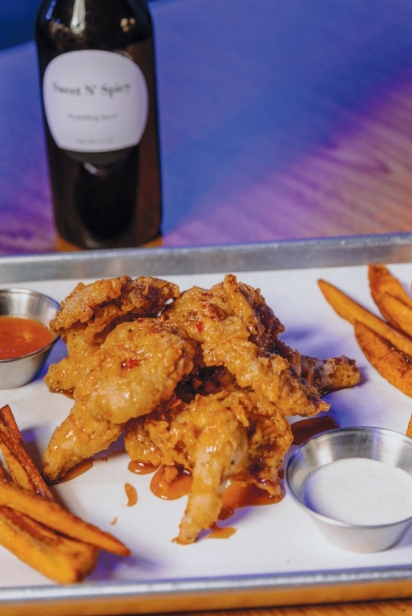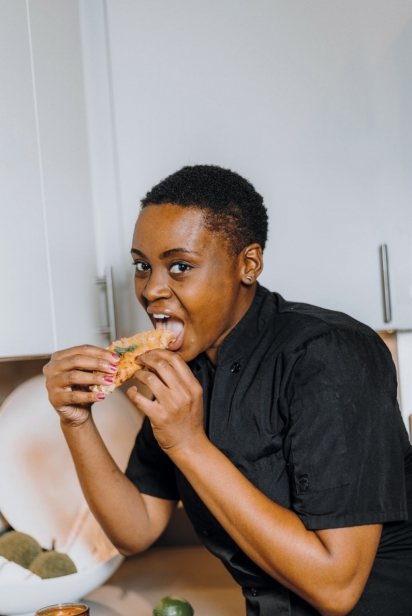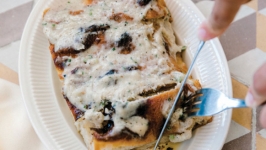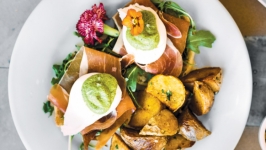Maybe We Should Change What We Eat
OKC’s Black Vegan Community Charts A New Path
As an undergrad, one of my classmates made the unorthodox decision to get married. One thing I will never forget about the reception was the food. The happy couple supplied their guests with…wedding cake and peanuts. As undergrads, it was the most they could afford. In an act of boldness, one attendee took it upon himself to leave and find “real” food. He returned, “real” food in hand. He ate his Raising Cane’s while we snacked on peanuts. We outwardly judged him but secretly applauded him. Why? We were all thinking the same thing: “You can’t bring Black people together and not have ‘real’ food.”
Food, or “real” food, expectations among African Americans differ depending on the part of the country and their family’s ancestral background. When it comes to Soul Food on the plains, we expect turkey in our collard greens, our pork chops fried, and our tea to be sweet. A native of Louisiana might have grown up on crawfish, shrimp, and fried fish straight from the swamp. Regardless of where you come from, food is deeply personal and an integral part of all gatherings.
But, there’s been a noticeable shift in the African American palate in Oklahoma City. Perhaps even an awakening. More of us say, “What are your vegan options?” or “I want that, but without the meat.” Surprisingly, this stance has less to do with animal rights and more to do with the human body.
“My best friend had lupus,” says Chef Nicole Asali of Soul Harvest Meals, who became vegan after becoming a chef. “She was super sick and I came across something that was telling me about alkaline diets. So, I talked to her about it. I said, ‘Hey I think this might help you, maybe we should change the way we eat.’”
Initially Chef Asali would bring her friend salads, but it was hard to stay consistent. As her friend’s lupus progressed, she remembers sneaking pulled pork nachos into the hospital room in her final days. “It made me question food in a different way and wonder why she’s literally on her death bed and we can’t let go of it,” she says. “So, I ended up going vegetarian, and then I started learning more.”
Traditionally meat focused, Chef Asali is hoping to change how soul food is perceived and ensure people know that avoiding meat doesn’t mean a life without their favorites. “It’s just a mental shift,” Chef Asali says. “Black people are known for creating something out of nothing, and I feel like veganism is creating a new version of soul food. In some ways it feels like you are doing God’s work.” Her business, Soul Harvest Meals, was one of the first Black-owned sources for vegan food in OKC.
Laurel Mauldin is the CEO of A Table in the Wilderness, a nonprofit organization providing healthy spiritual and physical food to those who need it. She believes there is a direct correlation between what we eat and how our brains function. “Food feeds the brain, and without the proper nutrients, many people end up with physical and mental health challenges,” Mauldin says. She believes racism, bigotry, and prejudice have resulted in African Americans dying from preventable and curable diseases, some caused or exacerbated by diet. In her case, she believes that most illnesses can be prevented by not consuming meat.
A Table in the Wilderness offers the Healthy at Home program, which is a free community cooking class held on Zoom that allows attendees to cook alongside the hosts. A Table in the Wilderness provides ingredients, recipes, and a kitchen tool to local attendees, which they pick up on a designated day prior to the class. The organization also distributes healthy food to the community with their mobile plant-focused pantry, with a brick and mortar version on the way.
Another community standby is Café420 The Alkaline Plant-Based Stop on NW 4th and Walker, which is home to the original Mush- Wings. Through meticulous testing, MushWings are chicken wings reinvented by using oyster mushrooms instead and come in a variety of tempting flavors, including lemon pepper, garlic parmesan, Cajun, and mango habanero.
Demand in OKC’s vegan community is engaging newcomers, as well. Louis Gholston, professional musician, moved from Michigan to Oklahoma in 2020 with hopes of being part of the growing cannabis industry. However, setbacks prevented him from obtaining a grower’s license. He was exploring his next career move when a Facebook post changed his trajectory.
One day, after cooking dinner for his family, he posted a picture of his vegan chicken sandwich on the Red Earth Vegans Oklahoma Central Facebook page. The post went viral, and Gholston graciously welcomed his new followers to his house to get a free sample of the now-famous Casso’s Chick’n sandwich. “I didn’t know I was going to have a whole tribe in line in front of my house,” Gholston said. “So, I’m running in and out, just giving out free, plant-based chicken sandwiches.”
Gholston went vegan three years ago after watching the Netflix documentary, What the Health. He believes comfort food and the emotions and memories it draws on is what satisfies a new vegan’s taste buds. “[You’re] able to eat something similar to that thing you haven’t had in forever, but just in a healthier and ethical way,” he said.
For Gholston, that something similar is Casso’s Chick’n patties. Starting with pop up shops, Gholston eventually made the decision to go into manufacturing. He’s started selling his patties to restaurants, grocery stores, and hospitals in Oklahoma, Michigan, and Texas. “The food we deal with on the daily isn’t just food to fill you up but a natural medicine,” Gholston believes. “Being a vegan chef is more than just a grill and a fryer, we’re trying to save lives here, too.”
In 2020, I became a vegetarian. At the start of 2022, I went vegan for a month and it may be the most disciplined and best I’ve ever felt physically. But, food is central to my community. Friends still ask if I’m sure I don’t want the ribs on the table. The craving for certain foods is so strong, whether that strength is in the current cultural connection to your friends, family, and community or the nostalgia for the food of your childhood. Driven by that craving and nostalgia, OKC’s Black vegans are building a new path of strength for the community, together.


